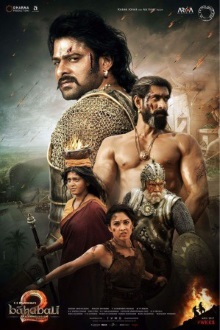
Since this sequel is a direct continuation of the first film I didn’t want to leave off watching it for too long. As usual with such epics, the running time is excessive but given the nature of these films, they’re easy on the eyes and not exactly taxing on the intellect. As with the previous film, it continues the story of both father and son though I was somewhat surprised to note that the portion allotted to the elder Baahubali carries heavier weight.
Kattappa the slave captain continues his narration with how Amarendra Baahubali goes on a tour of the kingdom before his coronation. While visiting the neighboring state of Kuntala in disguise, he falls in love with its princess Devasena. His brother Bhalladeva lusts after her as well and maneuvers his mother Sivagami to banish Baahubali for refusing to give up Devasena. For a while Baahubali and Devasena live with the commoners and Bhalladeva realizes that he will never truly be king unless his brother is dead. So he fakes an assassination plot to force his mother to order Kattappa to kill Baahubali. Kattappa regretfully does so but tells Sivagami the truth, causing her to repent and proclaim the infant Mahendra Baahubali to be the king, joining up with the beginning of the story from the first film. After hearing this epic tale, the junior Baahubali immediately sets off to seek revenge for his parents.
Back in my post about the first film, I talked about how it was India’s answer to The Lord of the Rings. This sequel takes that up to eleven, being more akin to a live-action World of Warcraft. One scene features a monstrosity of a ship with multiple overlapping sets of sails that the elves of Kalimdor would be proud of, cruising past a fantastically colored landscape. I also wrote about how it’s heartening to have the main character be like a demigod out of mythology. Here he is even more perfect at everything taking on in addition to his roles as warrior and war leader those such as lawgiver and engineer. It gets a bit much when even his underlings, despite not having undergone any training under him, prove capable of ridiculous feats as well as they demonstrate by clumping together into human cannonballs to rain down on enemies. All realism issues aside, it does make for a rather wonderful and impressive spectacle with particularly creative use of slow-motion violence to emphasize battles as being clashes between titans.
The plot is standard fare and completely predictable. I did like that Bhalladeva’s intrigues are moderately intelligent and it would be totally in character for Baahubali and Sivagami to fall for them. I also really liked the subplot with Kumara Varma as Baahubali encourages him to become a true hero. I do think they went a bit overboard with the musical montages as it feels like anytime there isn’t a fight going on there has to be dancing and singing. I am especially disappointed that character development scenes in the latter part of the film set in the present are lacking. Poor Avanthika doesn’t have a speaking role and it’s downright criminal that no credit is given at all to the mother who actually raised the younger Baahubali to adulthood. In general the present scenes are all action with no dramatic depth left as the conclusion of the elder Baahubali’s story is a natural climax. This causes the film to feel as if the pacing is off. I think a better technique might be instead of showing the entire story of the elder Baahubali in one shot, they might intersperse the narration with scenes of the present to better develop the younger Baahubali as he reacts to what he learns.
Overall I still quite liked the film and consider it to be a perfectly cromulent superhero film. It’s great to have some variety and it does show plenty of creativity in dreaming up ever more superhuman stunts for the characters to perform. Watching Baahubali use an elephant’s trunk to help him draw and fire a massive bow was pretty cool. It is however a notch lower in quality than the first one and I’m rather glad that they didn’t drag it out further to make a trilogy.